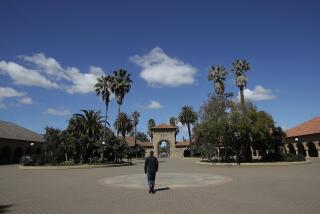Bush Opposes ‘Legacy’ Edge in College Admissions
- Share via
WASHINGTON — President Bush, whose father and grandfather preceded him in attending Yale University, said Friday that he opposed special treatment in college admission for children of alumni, just as he opposed special treatment for racial and ethnic minorities.
In a question-and-answer session with minority journalists, Bush said he favored programs that increased diversity in the student body, but was against quotas for minority groups, as well as so-called legacy admissions.
“I think colleges ought to use merit in order for people to get in,” Bush told the UNITY convention, a joint national conference of four professional organizations of black, Latino, Asian and Native American journalists.
Asked directly whether he favors affirmative action, Bush replied: “I support colleges affirmatively taking action to get more minorities in their school.... I support diversity; I don’t support quotas.”
Bush has walked a fine line on the issue of promoting racial diversity. He urged the Supreme Court to overturn two affirmative action programs at the University of Michigan, but then praised the court’s decision to overturn one and uphold the other.
Ralph Neas, president of People for the American Way, a civil rights advocacy group, said Bush’s comments showed that he was “trying to have it both ways on affirmative action again.” As for the issue of ending college legacies, Neas quipped: “That’s like a Powerball winner coming out against lotteries.”
Roger Clegg, general counsel for the Center for Equal Opportunity, an advocacy group that opposes affirmative action, generally praised the president’s stand.
“The point he was making was if you believe in admitting people on the basis of merit, then you also ought to oppose legacy preferences. I personally do agree with that,” Clegg said.
Sen. John F. Kerry, the Democratic presidential nominee, also went to Yale, as did his father.
Bush graduated from Yale in 1968. The president’s daughter Barbara graduated from the school this year. In 2003, 14% of those in Yale’s freshman class were legacies.
In his remarks, Bush acknowledged the irony. “I thought you were referring to my legacy,” he teased a questioner, then added: “Well, in my case, I had to knock on a lot of doors to follow the old man’s footsteps.”
Asked later to clarify that comment, White House spokesman Scott McClellan said: “The president was referring to how hard he had to work to follow his father into the White House.”
The president’s comments on legacy college admissions earned the strongest applause from the crowd, which was otherwise largely unresponsive to his remarks.
Some attendees worried before Bush’s appearance that the president, who had strained relations with many national minority organizations, would get a less-than-friendly reception. But with the exception of one heckler, who was shushed by the audience, listeners were polite if pointed in their silence.
Sandra Combs Birdiett, an editorial writer at the Detroit News, said the only time she applauded the president was when he said he opposed legacy admissions.
“I was shocked he said that,” she said.
Democratic presidential nominee Sen. John F. Kerry addressed the UNITY conference Thursday and earned hearty applause and standing ovations when he first appeared and then when he finished his remarks.
Many of those attending the convention said they were conflicted about whether they were responding as voters or journalists when they were in the audience, and whether the support shown for Kerry and withheld from Bush was inappropriately partisan.
Danica Coto, a police and courts reporter for the Charlotte Observer, said she thought it was fine for journalists to express opinions about the candidates as long as they were responding as voters, not covering the event as journalists.
“We’re all human. We’re not just reporters,” she said.
After his Washington speech, the president stopped at a campaign picnic in Stratham, N.H., while on his way to spend the weekend at the Bush family compound in Kennebunkport, Maine.
Bush is expected to attend the wedding of his nephew, George P. Bush, in Kennebunkport today. The groom is the son of Gov. Jeb Bush of Florida, the president’s younger brother.
In his campaign speech in New Hampshire, Bush challenged Kerry, whom he never referred to by name, to give a “yes or no answer” to the question of whether he would have “gone into Iraq” in the absence of weapons of mass destruction.
“Now there are some questions that a commander in chief needs to answer with a clear yes or no,” Bush said. “My opponent hasn’t answered the question of whether, knowing what we know now, he would have supported going into Iraq. That’s an important question, and the American people deserve a clear yes or no answer.”
Bush added: “I have given my answer: We did the right thing, and the world is better off for it.”
For Bush, New Hampshire, with four electoral votes, stands as a lone bright spot in the Northeast, the only state he carried in New England in 2000. Bush won the state by 1 percentage point, or 7,211 votes.
Recent polls show a virtual tie between Bush and Kerry.
“We won New Hampshire last time; we’re going to win it this time,” he told a crowd of several hundred.
Friday marked Bush’s seventh visit to the state, and his fourth this year.
*
Times staff writer Edwin Chen contributed to this report from Stratham, N.H.
More to Read
Get the L.A. Times Politics newsletter
Deeply reported insights into legislation, politics and policy from Sacramento, Washington and beyond. In your inbox twice per week.
You may occasionally receive promotional content from the Los Angeles Times.










